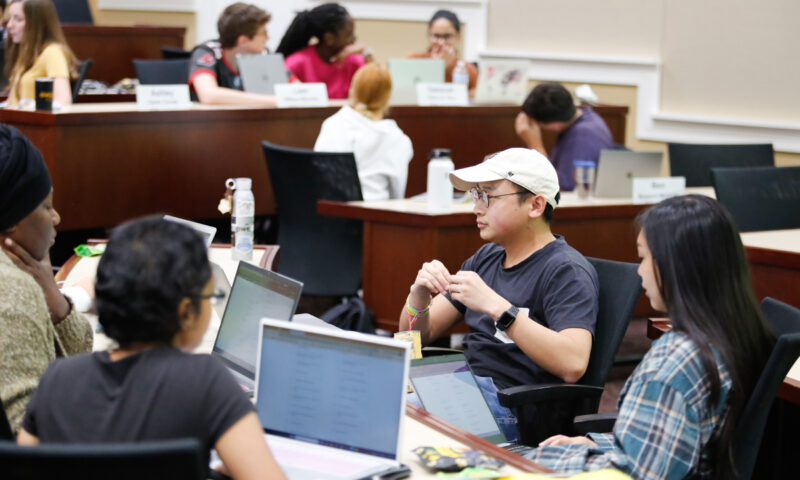
Students at work
In an increasingly data-driven world, the accounting profession has had to face new challenges and opportunities to adapt to continuous technological disruptions. “The field of accounting is changing in very different ways, and all organizations are looking for opportunities to capitalize on analytics and, process and use data more efficiently,” said Professor Chris Maurer. The M.S. in Accounting program at the University of Virginia integrates data analytics into the curriculum to make students more data savvy and prepare them for the field.
During fall term, students were required to take Data Management and Analytics for Accountants, which taught us how to organize, analyze, and process data to learn relational database systems design and querying using SQL. (SQL stands for Structured Query Language and is a standard computer language for relational database management and data manipulation.) Our semester-long project included solving a business problem by building a database to store data using SQL, create reports, and create meaningful visualizations using Tableau.
In the spring, all students in the Financial Reporting & Assurance Track are required to take Forensic Accounting, which requires an understanding of data management and analytics as this course emphasizes the technology skills required of forensic accountants. We use IDEA, a data analysis software that automates many audit processes. IDEA saves auditors time and effort because it allows them to create reports from scratch, standardize workflows, and analyze large data sets just to name a few benefits. Moreover, IDEA is used by most large accounting firms, so it will be a useful tool to have under our belt once we begin our jobs. For example, we analyzed a large accounts payable database in IDEA to identify payments made to unauthorized suppliers to identify risks of fraud. “Everything today is digital, so to understand accounting you must also understand data. Students in our program are exposed to a unique but critically important combination of accounting and advanced data analytics,” said Professor Eric Negangard.
Finally, Information Technology in Finance taught by Stefano Grazioli, is an elective offered in the spring term and a highly technical class that mainly uses Visual Studio, an incredibly powerful computer programming software tool. We’re learning to build code and thus far, we have built an automated financial calculator and built canned and dynamic SQL queries. I chose to take this course because I want to acquire more technical skills that will teach me shortcuts and give me a competitive advantage in the fast-paced accounting industry. I’m looking forward to our final project where we will participate in the McIntire Hedge Tournament, which requires us to build a robotrader that manages a $50M portfolio of stock and options in real-time settings.
Overall, analytics is a key skill to be successful in the current marketplace and remain competitive on the job. McIntire places a great emphasis on preparing students to learn the technical skills and apply them to a business context while possessing an intellectual curiosity. Accountants can use these skills to help businesses reveal valuable insights in their financials and better manage risk.


